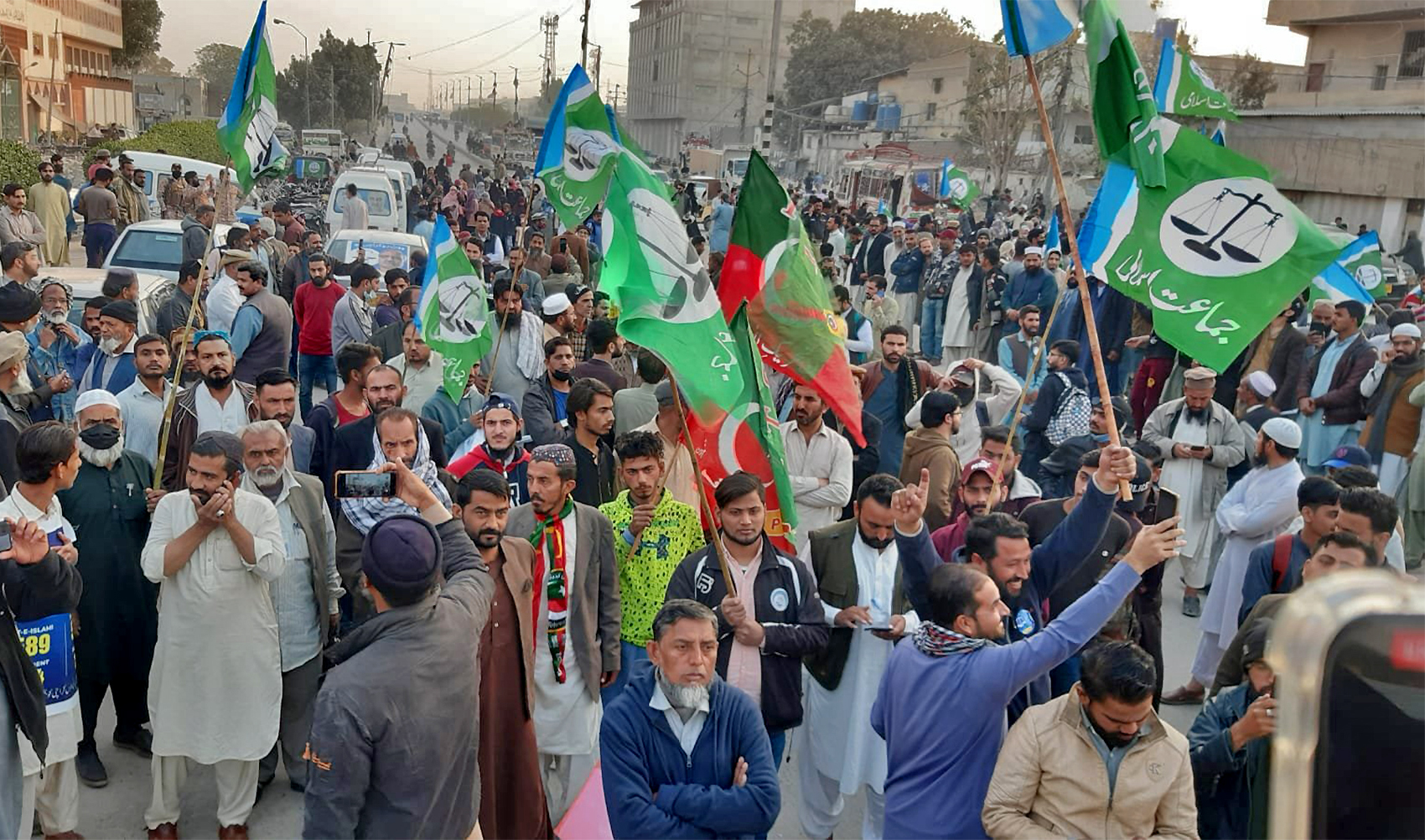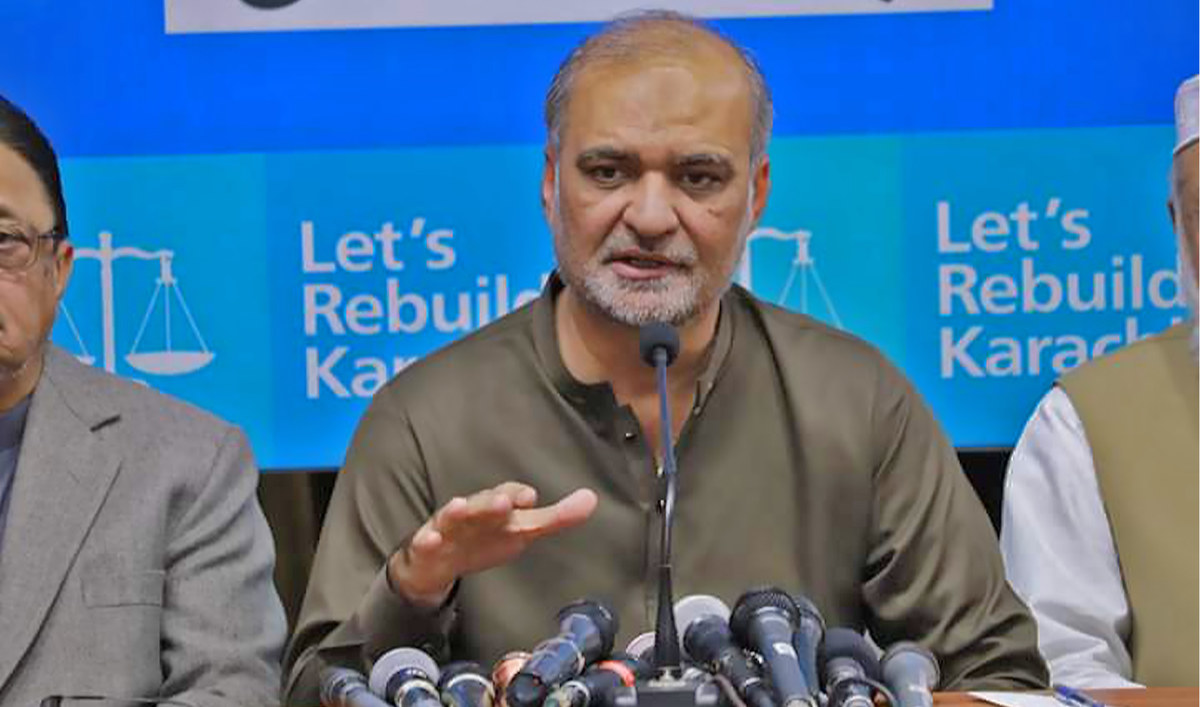KARACHI: A Pakistani religious party that made its mark in the recent local government elections in Karachi is wooed by other political factions after securing second place in the contest, as the race for the coveted position of mayor begins in the country’s southern port city.
The local polls, which were held last Sunday to elect union council members, were primarily dominated by Sindh’s ruling Pakistan Peoples Party (PPP) along with Jamaat-e-Islami (JI) who won from 93 and 86 administrative units, respectively.
Former prime minister Imran Khan’s Pakistan Tehreek-e-Insaf (PTI) party secured 40 seats while other political factions won 16. Polling was postponed on 11 seats due to the death of various candidates.
Since no party managed to get enough vote to bring its own mayor, the indirect election for the post is expected to get more complicated.
“Nothing is possible in politics but we can’t make an alliance with the PPP,” said Firdous Shamim Naqvi, a top PTI leader in Sindh, on Tuesday. “There is a possibility of making an alliance with the JI for the mayor’s election.”
Naqvi said the PPP had “deprived” his party of its mandate by creating confusion about the timings of the electoral contest by delaying it several times.
“The PPP also robbed us of our mandate through unjust delimitation of constituencies,” he added.

The supporters of a Pakistani religious party, Jamaat-e-Islami (JI), protest against the results of the local body elections in Karachi, Pakistan, on January 17, 2022. (@KarachiJamaat/Twitter)
Addressing a news conference, Saeed Ghani, a senior leader of Sindh’s ruling party, said every political faction had the right to elect its candidate for the position of Karachi’s mayor, adding there was nothing wrong if the JI tried to do it.
“The PPP and the JI should accept everyone’s mandate in the interest of the city,” he said. “We are ready to talk and make a way out.”
“The PTI is not worthy of being contacted,” Ghani added.
Sindh Chief minister Murad Ali Shah said the provincial administration was ready to work with the JI, but the mayor’s position should go to his party.
“The Pakistan Peoples Party has won most of the union councils and has the right to get the mayor’s seat,” he continued.
Speaking to Arab News, Hafiz Naeem-ur-Rehman, the JI chief, said his party would think about an alliance after the PPP handed it back the seats that rightfully belonged his faction.
“Our doors are open to everyone but our primary aim is to get the mandate back,” he said, adding that the number of his party seats had gone up to 89.

Hafiz Naeem-ur-Rehman, the chief of Jamaat-e-Islami (JI), speaks to the media in Karachi, Pakistan, on January 12, 2022. (@KarachiJamaat/Twitter)
Dr. Tauseef Ahmed Khan, a political analyst, said the PPP should pay attention to JI’s objections and let it form the local government.
“Such an administrative setup will also have the trust of Urdu speaking community,” he told Arab News.
“We have seen a different face of Jamaat-e-Islami which is both liberal and progressive,” he continued. “The party has raised its voice for all communities and classes, irrespective of their race and religion, under Hafiz Naeem-ur-Rehman. He has worked for non-Muslims and transgenders as well.”
According to another political commentator, Zarrar Khuhro, an alliance between the PPP and PTI looked impossible while the JI was not likely to settle down for a junior post while negotiating with the PPP.
“Jamaat-e-Islami may make an alliance with the PTI to elect its mayor since Hafiz Naeem may not accept a junior post from the PPP,” he told Arab News.
Khuhro added he was not surprised by the large number of seats won by the JI.
“The results are the fruit of consistent campaigning over the issues of Karachi,” he said. “It was the only party that constantly raised urban issues and was also the most vocal when it came to the demand of holding local government elections.”
He attributed PPP’s victory to the recent delimitation exercise while pointing out that the PTI heavily relied on former prime minister Imran Khan’s personality despite the dynamics of local polls which were totally different.
“PTI is popular in Karachi despite its leadership in the city,” he said. “But the party banked on Khan’s popularity.”
















